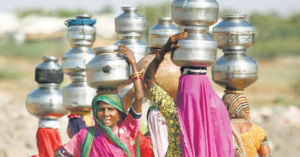Physical Address
23,24,25 & 26, 2nd Floor, Software Technology Park India, Opp: Garware Stadium,MIDC, Chikalthana, Aurangabad, Maharashtra – 431001 India
Physical Address
23,24,25 & 26, 2nd Floor, Software Technology Park India, Opp: Garware Stadium,MIDC, Chikalthana, Aurangabad, Maharashtra – 431001 India

Access to clean and safe water is a fundamental human right, and it can have specific implications for women due to their roles and responsibilities in many societies. However, the world’s water cycle has changed due to climate change. In this world water week, we contacted Dr. Ravindra Kariyawasam, an expert in water management, to discuss how climate change has affected women and women’s rights.
Water and climate change are inextricably linked. We feel its impacts through worsening floods, rising sea levels, shrinking ice fields, and extreme droughts. Climate change exacerbates water scarcity and water-related hazards, as increasing temperatures disrupt precipitation patterns and the entire water cycle. More can be read here,
Dr Ravindra Kariyawasam explains that Countries below the equator are the most affected by the water crisis caused by climate change. Sub-equatorial countries often have male-dominated societies, so women are mainly responsible for children and household work. When the fathers go to work, the woman/mother has to carry out water in areas lacking drinking water, and women have to walk long distances in search of water.
In Rajasthan, India, some women walk many kilometres holding 5,6 pots on their heads in search of water. In India and Sri Lanka in areas like Vavuniya, Mullaitivu, and Hambantota, women daily walk long distances to bring water dr. Ravindra added.
SDG Report 2022 report reveals that about two billion people worldwide don’t have access to safe drinking water today, and roughly half of the world’s population is experiencing severe water scarcity for at least part of the year (IPCC). These numbers are expected to increase, exacerbated by climate change and population growth (WMO).
Only 0.5 per cent of the water on Earth is useable and available freshwater and climate change is dangerously affecting that supply. More can be read here.
Research has now shown that climate change would not have been so severe without human environmental intervention. Since droughts caused by climate change also affect women and young children the most, climate change violates women’s right to access clean water. Dr Ravindra added. Women’s health is closely linked to water and sanitation. Access to clean water and sanitation facilities is essential for menstrual hygiene management, childbirth, and overall health. This can significantly affect their time, health, and overall well-being.
Also, when considering safety, Women and girls who travel long distances to collect water are often at greater risk of harassment, assault, or other dangers during their journeys. On the other hand, women and girls in communities with limited access to clean water may spend a significant amount of time each day collecting water from distant sources. This can prevent them from pursuing education, income-generating activities, or community life. When girls spend a significant portion of their day fetching water, it can impact their ability to attend school regularly and perform well academically.
Gender, climate change, and water are one of the primary keys to fulfilling the goals set out in the Paris Agreement will be wise water management. SIWI suggests that women participating in decision-making are most important in tackling this case.
The recommendation for women’s access to safe water includes the following.
Engaging women in planning, implementing, and maintaining water infrastructure and services can lead to more sustainable and effective outcomes. Improved access to water and sanitation can contribute to women’s empowerment by freeing up their time, allowing them to engage in income-generating activities, and participating in decision-making processes. However, Dr. Ravindra explains still world leaders need to deliver suitable action to help women access clean water worldwide. Recognising the importance of gender in water management, policies, and interventions should consider women’s specific needs and roles to ensure equitable access to water resources.
If you have any queries or come across suspicious content related to climate change or the environment and want us to verify them for you, then send them to us on our WhatsApp hotline: +917045366366